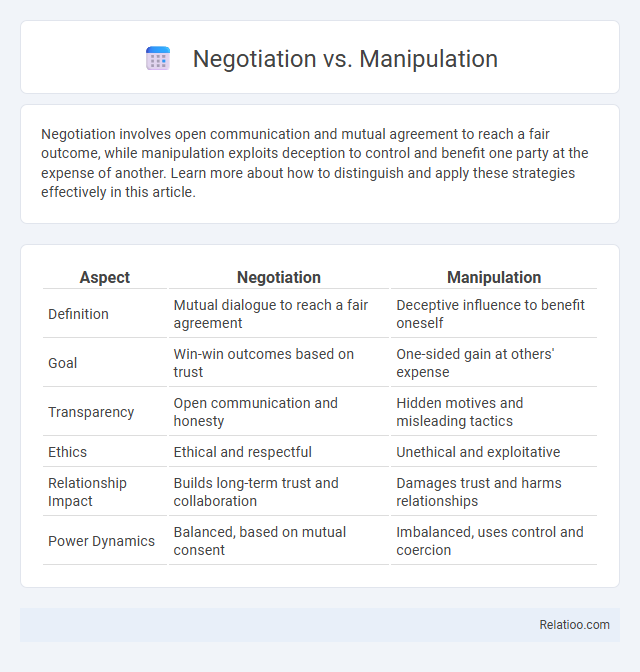Negotiation involves open communication and mutual agreement to reach a fair outcome, while manipulation exploits deception to control and benefit one party at the expense of another. Learn more about how to distinguish and apply these strategies effectively in this article.
Table of Comparison
| Aspect | Negotiation | Manipulation |
|---|---|---|
| Definition | Mutual dialogue to reach a fair agreement | Deceptive influence to benefit oneself |
| Goal | Win-win outcomes based on trust | One-sided gain at others' expense |
| Transparency | Open communication and honesty | Hidden motives and misleading tactics |
| Ethics | Ethical and respectful | Unethical and exploitative |
| Relationship Impact | Builds long-term trust and collaboration | Damages trust and harms relationships |
| Power Dynamics | Balanced, based on mutual consent | Imbalanced, uses control and coercion |
Understanding Negotiation: Definition and Core Principles
Negotiation is a strategic communication process where parties with differing interests seek mutually beneficial agreements by exchanging proposals and concessions. Core principles include effective listening, clear communication, and the pursuit of win-win outcomes through collaboration and empathy. Unlike manipulation, which involves deception and coercion to achieve one-sided goals, negotiation prioritizes transparency and respect for all participants' needs.
What is Manipulation? Key Characteristics Explained
Manipulation involves influencing others through deceit, exploitation, or coercion to achieve personal gain, often at the expense of their interests. Key characteristics include a lack of transparency, emotional exploitation, and controlling behaviors that undermine free will. Understanding these traits helps you recognize manipulation and protect yourself from unethical tactics.
Negotiation vs Manipulation: Fundamental Differences
Negotiation involves open communication aimed at reaching a mutually beneficial agreement, emphasizing transparency, trust, and collaboration between parties. Manipulation, by contrast, relies on deceit, coercion, or exploitation to achieve one party's goals at the expense of the other. The fundamental difference lies in negotiation fostering equitable outcomes, while manipulation undermines trust and leverages hidden agendas.
Psychological Tactics in Negotiation and Manipulation
Negotiation employs psychological tactics such as active listening, empathy, and strategic questioning to create mutually beneficial agreements while maintaining trust and transparency. Manipulation relies on psychological strategies like guilt-tripping, deceit, and emotional exploitation to control or coerce others for personal gain, often undermining trust and ethical boundaries. Understanding these distinctions helps you recognize and respond effectively to genuine negotiation efforts versus manipulative behavior.
Ethical Implications: Where Negotiation Ends and Manipulation Begins
Negotiation is rooted in mutual respect and honest communication, aiming for a win-win outcome that benefits all parties ethically. Manipulation crosses ethical boundaries by exploiting information asymmetry or emotional leverage to unfairly influence others, often causing harm or mistrust. Your awareness of these distinctions ensures that your interactions remain transparent and principled, fostering long-term relationships built on trust rather than deception.
Real-world Examples: Negotiation vs Manipulation in Practice
Negotiation involves transparent communication aimed at reaching a mutually beneficial agreement, such as a labor union negotiating fair wages with management. Manipulation uses deceit or coercion to exploit others' weaknesses, exemplified by a salesperson using misleading information to pressure a customer into buying an unwanted product. Real-world examples highlight how negotiation fosters trust and long-term relationships, whereas manipulation often results in conflict and damaged reputations.
The Role of Communication in Both Strategies
Effective communication plays a crucial role in both negotiation and manipulation, but their intentions differ significantly. Negotiation involves transparent dialogue aimed at reaching a mutually beneficial agreement, while manipulation uses communication to deceive or coerce others for personal gain. Your ability to discern honest negotiation from manipulation hinges on recognizing these distinct communication strategies.
Long-term Consequences: Building Trust or Breeding Distrust
Negotiation fosters long-term trust by promoting transparency, mutual respect, and collaborative problem-solving, which strengthens relationships and encourages future cooperation. Manipulation often leads to breeding distrust as it relies on deceit, hidden agendas, and exploiting vulnerabilities, ultimately damaging reputations and undermining future interactions. Consistent use of negotiation enhances credibility and sustainable partnerships, whereas manipulation risks isolating parties and creating adversarial dynamics.
Recognizing Manipulative Behaviors in Negotiations
Recognizing manipulative behaviors in negotiations is essential for protecting your interests and ensuring fair outcomes. Common tactics include misinformation, emotional exploitation, and pressure to hasten decisions, which undermine transparency and trust. Developing awareness of these signs helps you maintain control and make informed, ethical negotiation choices.
Best Practices for Ethical and Effective Negotiation
Effective negotiation requires clear communication, active listening, and mutual respect, setting it apart from manipulation, which relies on deception and coercion. Ethical negotiation practices focus on creating win-win outcomes, fostering trust, and maintaining transparency to build long-term relationships. To ensure your negotiation remains ethical and productive, prioritize honesty, understand the other party's needs, and aim for agreements that benefit all stakeholders.

Infographic: Negotiation vs Manipulation
 relatioo.com
relatioo.com